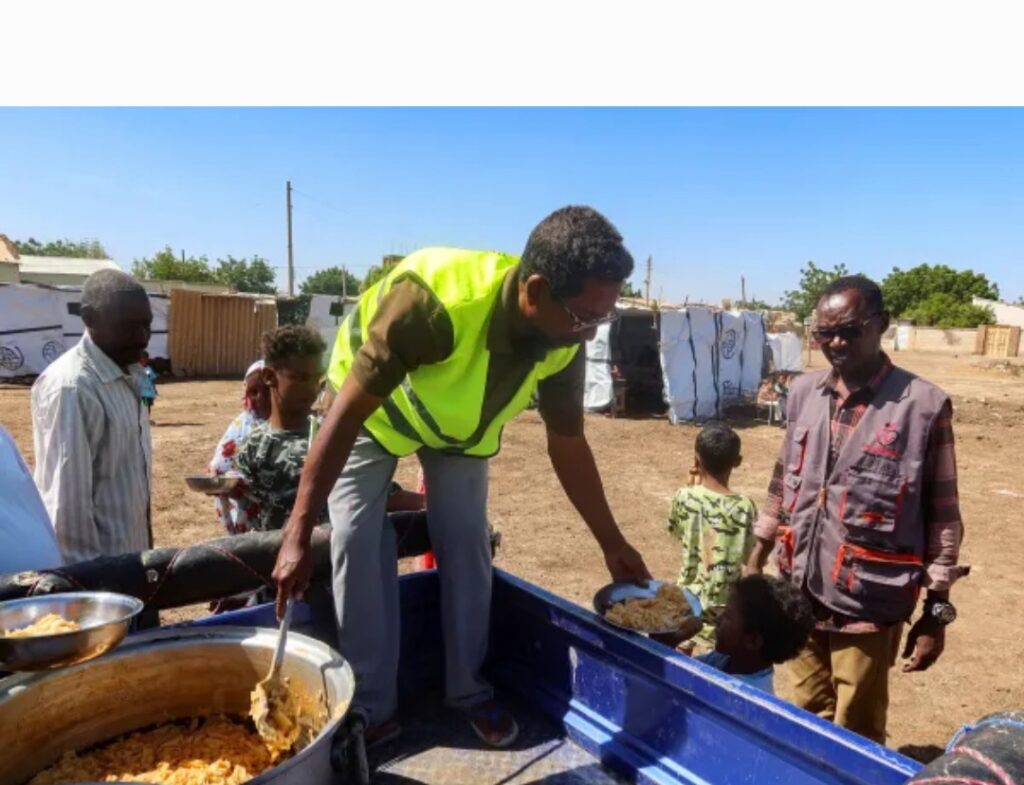“I can’t help but feel hopeful, seeing my children partake in these classes.”
Despite pledges to localise aid, international organisations have not funded the emergency response rooms to the level they require.
International organisations are typically more used to partnering with registered national NGOs, than volunteer-based community groups.
Donor governments also have rigid policies and funding procedures that tend to clash with how local response efforts are organised and with what their priorities are.
Some international organisations have also deemed the groups too “political” given their links to the pro-democracy committees that were central to the protests that forced out former leader Omar al-Bashir in 2019.
The failure to adequately and swiftly fund the emergency response rooms has made the international humanitarian system complicit in the famine conditions now prevailing across Sudan, mutual aid activists have argued.
Community groups and mutual aid networks in war-hit parts of Sudan have set up learning centres and safe spaces for children amid almost two years of disrupted schooling and because of continued inadequate support from international humanitarian agencies.
But members of the groups said they need more resources to expand their operations, ensure that children aren’t turning up to classes hungry, and to recruit and properly support teachers and volunteers who are themselves impacted by the conflict.
“We try to shield the children as much as we can, but the war takes a heavy mental toll on us volunteers,” said Reem*, who is teaching at a kindergarten in Omdurman, a city that has seen intense fighting and which is next to the capital, Khartoum.
Reem said a lack of essential services such as electricity and water, complicates the daily lives of volunteers involved in education work, though she said their programmes have helped children discover new talents and begin to heal from the trauma of war.
Over 17 million children are currently out of school in Sudan, the majority of them because of the war that erupted in April 2023. It pits the national army and aligned groups against the rebel-turned-paramilitary Rapid Support Forces (RSF).
The conflict has produced the world’s largest displacement crisis, uprooting over 11 million people, and the biggest hunger crisis too. Famine has been declared in the western Darfur region, and is likely prevailing in many other areas.
International aid groups and UN agencies are providing some education assistance in parts of the country where there has been less fighting. And schools have also reopened in some areas that are fully controlled by the army-aligned government.
However, in conflict areas that the warring parties block aid groups from accessing, it is community groups, including neighbourhood-based emergency response rooms, that are carrying the burden of delivering education and other services for children.
The emergency response rooms were set up across Sudan at the outset of the conflict, drawing on a rich heritage of mutual aid in the country. They are run by thousands of volunteers, who make daily meals and keep services like power and water running.
In Khartoum state (which includes the besieged capital and the adjoining cities of Omdurman and Bahri), emergency response room volunteers said they are running safe spaces for children to learn and play, as well as a handful of schools offering formal education.
Volunteers said their funding is covered by local and diaspora benefactors, as well as international aid agencies. But they said this support is extremely limited and doesn’t let them cover the needs of millions of children who have remained in Khartoum state.
Sara Elgieli, executive manager of the Sudanese Development Call Organisation, a national NGO, said donors and international aid organisations have been “hesitant” to fully support the community groups.
“The idea of supporting emergency response rooms is not embedded or taken seriously,” said Elgieli whose organisation is working with the groups on education and other areas.
“It is a community effort”
Even before the conflict erupted, some seven million children – equivalent to one in every three in the country – were unable to access quality education or were dropping out of school, according to the UN’s children’s agency, UNICEF.
UNICEF estimates that that number has now more than doubled, creating one of the world’s most severe education crises: 50% of teachers have not been paid their salaries for at least a year, and 40% of schools lack essential materials.
The majority of schools are now open in half a dozen northern and eastern states where government administrations are present, and UNICEF says it has provided formal and non-formal education to more than two million children.
However, even in places where authorities and international aid groups are present, it is still local communities that have been shouldering the responsibility for educating children, said Elgieli.
“We know in every state people are coming together and providing education to children and students taking exams,” she said. “Sometimes they receive support, but basically it is a community effort.”
In conflict areas like Khartoum state, volunteers said there are small initiatives being run in all neighbourhoods, from parents homeschooling their children, to groups of volunteer teachers addressing the needs of children within their locality.
“We observed countless children accompanying their mothers to receive food rations at cooperative kitchens, sometimes waiting for hours.”
However, interviewees said the main effort in the state – still home to several million people despite bruising battles between the RSF and army – is being led by the emergency response rooms, which were recently nominated for a Nobel Peace Prize.
Emergency response room volunteers said they have programmes that fund teachers to provide national curriculum lessons, and other projects that offer informal education as well as activities like art, sports, and music in child-friendly safe spaces.
Rajaa, a volunteer in Khartoum, said the initiatives came about because the emergency response rooms wanted to find a way to support children who would turn up every day at their community soup kitchens.
“We observed countless children accompanying their mothers to receive food rations at cooperative kitchens, sometimes waiting for hours,” Rajaa said. “We realised these children needed special meals to prevent malnutrition, and psychological support too.”
Bringing back “a sense of normalcy”
Prior to starting the programmes, Nada, a supervisor of safe spaces in Khartoum, said she had seen children struggling to cope with the conflict. She said she would often see them playing games that reflected ”the war around them”.
“Before this programme was established, younger children had begun losing essential learning skills, while older ones were grappling with psychological distress,” Nada said. “It was a burden that inevitably weighed on families.”
Rania, another volunteer in Khartoum state, said that by offering education and mental health programmes, the emergency response rooms have transformed into “vital community hubs”.
“We have launched several programmes across the capital,” Rania said. “Beyond academic [classes], we also included sports, cultural awareness, and mental and recreational exercises like drawing and colouring into our programmes.”
Rania said these programmes have equipped children with important coping mechanisms to manage stress, and have garnered positive feedback from families, who have seen significant improvements in their children’s mental health.
“We have observed the positive impact of these safe spaces on children and their families,” added Hisham, a volunteer in Omdurman. “Children can have a stable setting that fosters forms of self-expression and promotes healthy development.”
Tarig, a parent whose children are being cared for by an emergency response room, said the programmes have helped bring back “a sense of normalcy” that he worried had been permanently lost.
“Despite the hunger, the hours-long power outages, and the fear that we live in each day, I cannot help but feel hopeful, seeing my children partake in these classes and learning again,” Tarig said.
Limited funding
Despite the successes, volunteers and aid workers said the education programmes in Khartoum state are limited in what they can achieve, given the lack of funding and the massive demand.
UN agencies and international NGOs have provided some help to expand the programmes, but their funding has been limited, and project timelines have been too short-term, the volunteers and aid workers said.
“We could reach a large number of children in Khartoum because we are spread all across the state… but there is limited funding dedicated for these activities.”
Though several dozen safe spaces are being funded by international organisations, these spaces do not offer rigorous teaching and are only meant to plug a gap during school absences.
Meanwhile, only five formal learning centres have been supported in Khartoum state, through a project funded by UNICEF, which did not respond to requests for comment. The project, which is now over, saw small stipends given to teachers and a few thousand dollars provided for key supplies.
“We cannot operate a large number of spaces because of a lack of funding,” said Azza, another volunteer working on education initiatives. “We could reach a large number of children in Khartoum because we are spread all across the state… but there is limited funding dedicated for these activities.”
Elgieli of the Sudanese Development Call Organisation said children who are attending learning spaces are often turning up malnourished because there is no money for school meals. She said many children have also outgrown their clothes.
Volunteers also cited other daily challenges such as internet and communication blackouts, and said security issues are constantly cropping up, with some operations having to be suspended when there is a spike in fighting.
Efforts to prepare children for upcoming secondary school exams have, meanwhile, been complicated by the need to bring students from RSF-held parts of Khartoum state to areas where government ministries are functioning.
Volunteers said the emergency response rooms have been part of a wider effort to lobby the conflict parties to facilitate travel corridors for students, and to find funds to accommodate them near examination centres.
Mohamed Ibrahim Nikroma, a human rights activist from Sudan, said the efforts of the emergency response rooms are helping preserve the future of children in the country.
Still, he said the continued closure of schools could “spell doom for Sudan”, and called for international organisations to do more to “save millions of children from an uncertain and unknown future”.
*The names of all volunteers have been changed given the security threats they face.
This article was first published by the New Humanitarian:

